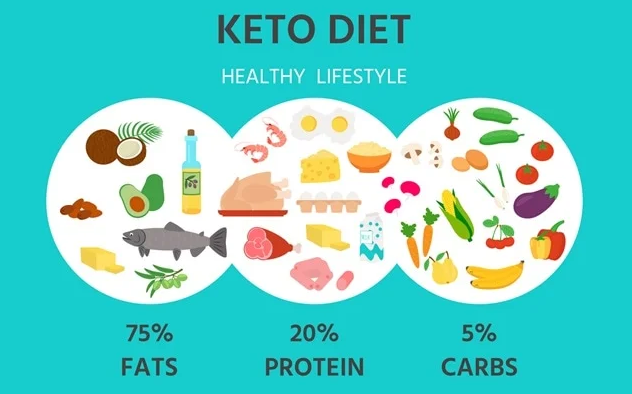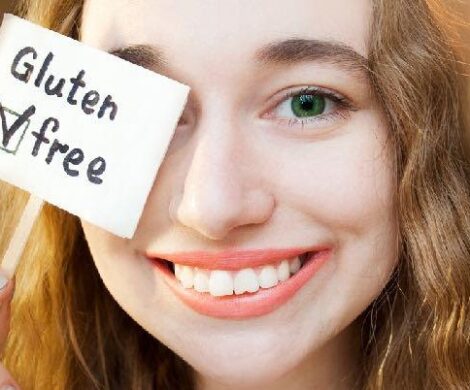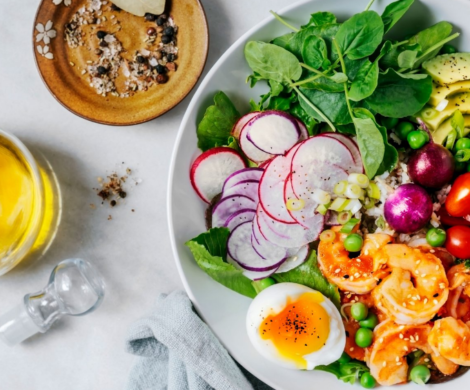Ketogenic Diet 101: Everything You Need to Know About the Popular Diet

Keto’ is one buzzword that has been doing the rounds around the interest for quite some time now. Also known as a low carb, high fat diet by practitioners, this diet has incredible health benefits. Whether you are a high-profile athlete or a common individual who wants to lose weight, this diet promises something for someone. Read on to know what exactly the ketogenic diet does, how does keto diet works, and how it supports weight loss.
What is a Keto Diet?
The ketogenic diet is a low-carb, high-fat diet. It is based on the notion that by restricting carbohydrate intake which is the chief source of energy the body uses to perform various tasks, it can be forced to burn fat for fuel. This process eventually leads to weight loss.
The ketogenic diet allows the body to attain a metabolic state called ketosis. During this process, the fat present in the liver is broken down into ketones which are then used to supply energy to the body. Well, this diet not only helps lose weight but also reduces blood insulin levels. It is even believed to help those struggling with cancer and Alzheimer’s.
What is Ketosis?
Ketosis is a metabolic state where the body uses fat to generate fuel instead of carbs so as to perform various tasks. The state is responsible for maximizing fat loss. Well, the metabolic process of ketosis occurs when the body doesn’t have sufficient glucose to generate energy. When there is a dearth of glucose which is the major source of energy, the body uses burning stored fat to fuel itself. This process leads to the production of ketones that are used for energy.
Different Types of Keto Diets
There are 4 popular types of ketogenic diets. These are:
- Standard Ketogenic Diet (SKD): Low carb and high-fat diet with modern protein intake
- Targeted Ketogenic Diet (TKD): In this diet, you can add carbs around your physical workouts
- Cyclical Ketogenic Diet (CKD): Includes a standard keto diet followed by high carb refeeds
- High Protein Ketogenic Diet: This diet includes more protein than the standard keto diet
How to Follow Keto Diet?
Wondering what can you eat on keto? Before we tell you what does the keto diet consist of, you need to calculate your daily calorie intake. In a standard keto diet, one is recommended to take 5-10% carbs, 10-20% protein, and 70-80% fat from daily calorie intake. For a 2000-calorie diet, it equates to 75 grams protein, 40 grams carbs, and 165 grams fat.
In CKD, 5-10% calories from carbs, 5-15% come from protein, and 90% come from fat. Further, in a high protein keto diet, 65% calories come from fat, 30% come from protein, and 5% come from carbs.
Depending on your fitness goal, you should opt for a particular keto diet. For instance – if you want improved performance on the ground, you need to choose a high protein keto diet. For weight loss, the standard keto diet is a wise option to opt for.
Well, the general way to follow a ketogenic diet is to limit carb intake and fill up your plate with fatty foods like eggs, nuts, fish, etc. Make sure to eat protein in moderation so as to reach ketosis. You can also rely on intermittent fasting to enter ketosis faster. Eat foods in around 8-9 hours per day and fat for the remaining hours. Once you have entered ketosis, you may feel decreased hunger, dry mouth, increased thirst, or frequent urination.
Benefits of Keto Diet
- Helps with Weight loss
A ketogenic diet can help you lose weight just like low-fat diets. In fact, it can be more effective in terms of weight loss especially long-term. An 8-week long study conducted in 34 adults has shown 5 times more reduction in body fat with keto in comparison to a low-fat diet.
- Reduces Symptoms of Diabetes
Diabetes occurs when you have impaired insulin function and high blood glucose levels. A ketogenic diet helps to eliminate excess fat which is associated with Type 2 diabetes. The diet is also known to improve insulin sensitivity thus managing the symptoms of diabetes. According to a study, following a keto diet improves insulin sensitivity by 75% eventually making a significant difference for diabetic patients.
- Improves Heart Health
A keto diet improves cholesterol levels, manages sugar levels, and controls blood pressure, all of which are risk factors for heart disease.
- Helps Treat Cancer
Researchers say that the keto diet can help slow down the growth of the cancerous tumor. This makes it a supplement treatment for cancer patients.
Other Benefits of Keto Diet
Additional benefits of the ketogenic diet include:
- Reduction in symptoms of Alzheimer’s
- Improvement in symptoms of Parkinson’s disease
- Reduction in epileptic seizures
- Can help with consequences of brain injuries
Foods to Eat in a Keto Diet
Thinking about what to eat on keto according to your age? Here is a list of recommended ketogenic diet foods for every individual:
- Fatty fish
- Meat
- Eggs
- Nuts and seeds
- Cheese, cream, butter, and other dairy products
- Healthy oils
- Spices and herbs like salt and pepper
- Low-carb vegetables
Foods to Avoid in a Keto Diet
Given below is a list of foods to avoid while following a ketogenic diet:
- Starchy grains
- Legumes and beans
- Low-fat foods
- Sugary foods and beverages
- Fruits except for strawberries
- Processed fats
- Root vegetables
- Diet foods
- Alcohol
Keto Meal Plan & Snack Options
Creating a weekly keto meal plan in advance can save you from the stress of thinking about what to eat and what not to. Rely on this 7-days ketogenic meal plan and snack options to enter ketosis sooner.
Monday
Breakfast: Egg, tomato, and spinach omelet
Lunch: Chicken salad with avocado oil and feta cheese
Dinner: Red meat dish with asparagus
Snack: Dark chocolate
Tuesday
Breakfast: Egg and vegetable muffins
Lunch: Avocado and olive salad with shrimp
Dinner: Salsa and cheese tacos
Snack: Full-fat Greek yogurt parfait with chocolate and nuts
Wednesday
Breakfast: Chocolate smoothie with peanut butter and sliced strawberries
Lunch: Broccoli and sesame chicken salad
Dinner: Mixed veggies with cauliflower
Snack: Keto-friendly snack bar
Thursday
Breakfast: Cream cheese pancakes drizzled with cocoa powder
Lunch: Beetroot, tomato, and zucchini salad
Dinner: Pork chops with vegetable salad and Parmesan cheese
Snack: Nuts and cheese
Friday
Breakfast: Chia seed pudding topped with shredded coconut and strawberries
Lunch: Beef lettuce wraps with bell peppers and cream cheese
Dinner: Cabbage and beef stew
Snack: Kale chips
Saturday
Breakfast: Scrambled eggs with goat cheese and tomatoes
Lunch: Cobb-egg salad
Dinner: Garlic-lemon chicken thighs
Snack: Guacamole with low-carb veggies
Sunday
Breakfast: Ginger spice smoothie and hard-boiled eggs
Lunch: Zucchini noodle salad with garlic sauce
Dinner: Chicken and veggie balls with cream cheese
Snack: Olives and sliced salami
Side Effects of Keto Diet
According to researchers and propellants, certain health risks are associated with a keto diet. These are:
- Keto flu symptoms including vomiting, diarrhea, and constipation
- Increased hunger
- Sleep issues
- Poor energy
- Decreased exercise performance
- Micronutrient deficiencies
- Extra level fat
- Kidney stones
A keto diet can also alter mineral and water balance in your body. In this case, it’s wise to take mineral supplements after consulting your doctor or keto diet specialist.
Bottom Line
A ketogenic diet can be beneficial for those who are trying to shed extra weight from their body and also those who are diabetic. The diet may not be apt for those who want bulky muscles. It’s better to consult a keto professional or dietician who can devise the right keto plan for you.










